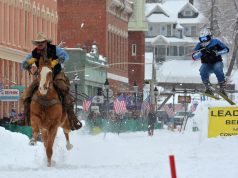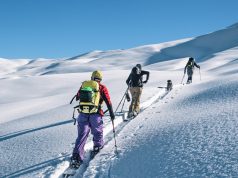
From one of the largest slums in Rio de Janiero, a twin set of granite cones, called the Two Brothers, rises a thousand feet toward the sky. The favela — the slum — below creeps up the hillside until the cliffs become too steep for houses and instead make a place for some of Brazil’s world class climbs.
When Boulder resident Asa Firestone first looked up at those enticing pillars from Ipanema Beach and asked local climbers about adding them to the tick-list for his months-long climbing trip through Brazil, they told him yes, there were routes, but no, he shouldn’t go try to do them. Climbers had established routes on Two Brothers in the 1960s, climbed them through the 1980s, and then a surge of violence from the gangs and drug cartels in the favelas that haloed the base of the peaks made the approach so dangerous that climbers all but gave it up.
So Firestone opted not to climb them. But he had another thought, he says: “What an opportunity for some of the kids from those neighborhoods, they’ve got this awesome climbing right out of their neighborhood.”
In 2011, with the help of a little grant funding, he was able to team up with Brazilian local climbing guide Andrew Lenz to create Centro de Escalada Urbana and teach kids from favelas to climb. This year, filmmaker Dominic Gill traveled to Brazil to capture that program and his film, Above the Alley, Beneath the Sky, screens at the Adventure Film Festival on Friday, Oct. 3. Above the Alley, Beneath the Sky focuses on Lenz and a pair of young climbers in the program, Patrick and Jonas, who are graduating from the slabby, single-pitch sport climbs at the base of the rock to attempt one of the multi-pitch, classic trad routes that ascend the Two Brothers.
In the years since Firestone first started visiting the favelas and climbing in Brazil, it’s gotten a little safer, he says. In 2010 in Rocinha, the largest favela in Brazil, he ran into a teenager about 15 years old with a machine gun around his neck. That’s not what he sees there now that the police pacification effort has moved in to replace the rule of the drug cartels — a change that’s been both good and bad. Firestone has walked into SWAT operations with a group of kids on the way back from a day of climbing, and the police pointed their guns at him and the kids. A report released this year by Amnesty International found that 80 percent of Brazilians don’t feel safe when they’re arrested. That’s nearly double the world average of 44 percent. Firestone remembers at least one recent incident of a man being tortured to death by the police. But, he says, the slums couldn’t go on being run by the drug cartels.
“These slums came about as sort of service providers, all the poor people came into the cities … and because they couldn’t afford to live in the city, they lived in these shanties that they set up outside of the cities,” says Gill, the filmmaker, who knew Firestone from days spent climbing in the Los Angeles area together. “Rocinha is one of a small handful of favelas that have become more developed as time goes by and are no longer just what one would think of as a traditional slum. It’s built up the hillside and all sorts of different people live there — a lot of incredibly poor people, very working class people, up to some middle class people that for whatever reason can’t afford to live in places they would prefer. Geographically, it’s built over time up the side of this hillside and literally stops where these enormous cliffs begin.”
And it’s on those rocky cliffs that climbing takes off.
“In terms of access, these kids can literally climb on some of the most amazing formations in Rio from their back doorstep,” Gill says. “They walk out into the alley, up a series of winding staircases and basically alleyways until they get to this — it’s actually a sort of drainage conduit made along the base of this 1,000, 1,200-foot cliff to prevent the water when it rains from sweeping down and washing the favela away, so that actually provides a walkway for the climbers to get up the routes that they want to climb.”
There are plenty of good reasons for getting kids — from any part of the world — outdoors. Kids who enjoy outdoor sports grow up to preserve and protect the natural places they’ve enjoyed.
“I looked at myself, I’ve struggled a lot throughout life and climbing’s always been something that brings me a lot of confidence in myself,” Firestone says. “It’s also a form of meditation. When I’m climbing, that’s one of the only times in my life when I am 100 percent focused and there’s nothing else I’m thinking about.”
Each Monday afternoon, the kids participating in the program have somewhere to be, and for some of them, coming out of chaotic lives in the favela, that’s a new level of obligation to fulfill.
“The kids are learning, through climbing, a sense of discipline, a sense of, first of all, fairly responsible behavior. If they say they’re going to turn up at a particular time, they learn that by not doing that, they are letting someone down. I think although a lot of us take that for granted — that’s an incredibly important life skill, to be reliable,” Gill says. “More relevant to climbing, I think that the sense of being attached to another person with a rope gives this very sort of intimate… it’s a very heightened sense of responsibility, I suppose. So you are, for the first time perhaps as an 11-, 12-, 13-year-old, being made responsible for someone else’s life in a very obvious and real sense, and I think with Andrew’s guidance and instruction, the kids become cognizant of this, and it’s very empowering to realize they can actually care for an individual.”
That’s what climbing with Centro de Escalada Urbana is and can be. Both Gill and Firestone also work to be clear on what it is not.
“Andrew makes no secret of the fact that he doesn’t believe that his program — it’s not setting out to save people. I think he wants to make it very clear, and I understand this, that he’s not a sort of white man going in and saving the lives of these Brazilian kids. That’s not how it is at all. But their lives have changed marginally,” Gill says. “I would say what he’s achieved is giving a lot of these kids somewhere between the big brother companion and friend, and an instructor. And obviously on the big brother side, he just provides an outside influence, outside of their families and friends within the favela, a different point of view, which is almost as important as the climbing instruction itself.”
Lenz has also gotten to know the community and the kids’ families, and makes sure they know what their kids are doing when they do disappear on those Monday afternoons with him.
“The families therefore are very pleased that, when they’re on the climbing program, they know that they are learning a skill that’s useful in all sorts of transferable ways and those kids are not just wandering around and, worst case scenario, flirting with drug gangs or whoever might otherwise get their attention,” Gill says.
Climbing isn’t a solution for all the child soldiers in the favelas, he says, but it might help.
“There’s a self realization in yourself that you can do these really cool things that you never really thought you could,” Firestone says.
“Perhaps the most kind of esoteric and exciting thing that these kids learn is that their life doesn’t just exist within the boundaries that they’ve grown up knowing about — those boundaries will largely be in the favela,” Gill says. “Whether it’s conscious or unconscious … climbing is literally and metaphorically broadening their horizons. They’re climbing up and getting a different view on the favela — they’re literally looking down on it — but through Andrew, they see that the normal kind of education, maybe getting a job somewhere within the favela, isn’t the only possible route that they can take, and I think that’s the most important lesson and it’s bolstered by the feeling of responsibility and learning a skill that allows you to safeguard not only your own life, but those of the people around you.”
The movement extends beyond the slowly growing climbing program to send fingers of change into the community, which also saw their first highline during the filming of Above the Alley, Beneath the Sky. Gibbon Slacklines, a sponsor for the film, also sent Gill to Brazil with some slacklines and connected him with Brazilian-based slackliners, some of whom are world champions. Those athletes came to the favelas and rigged up a high line between two of the tenement blocks.
“The highline was phenomenal, the locals haven’t seen much like it,” Gill says.
Firestone is also founder and CEO of Beyond Gear, which sells gear and climbing-centric jewelry to fundraise for the climbing program in Brazil.
Respond: [email protected]














